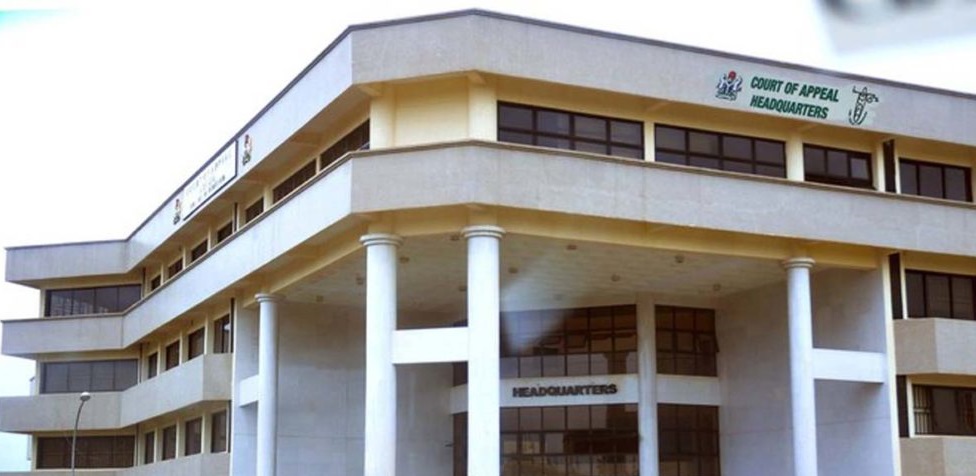 |
| Court of Appeal |
Justices (3) of the Court of Appeal have urged the apex court in the country to outrightly dismiss the “private complainants’ charge sheet” filed against them by a businessman, Alhaji Abdulrauf Tijan, and Tundokun Invest Co. Ltd for lack of merit and mischievous in nature to rubbish their high earn reputations.
The petitioner accused the three Justices of the Court of Appeal, Justice Jumai Sankey, Justice Onyekachi Otis and Justice Joseph Ekanem of conducting themselves as third parties and accessories in an N8.9billion alleged theft case they filed against First Bank of Nigeria (FBN).
In their appeal being handled by the three Appeal Court Justices, the claimants alleged that the N8.9bn was stolen from their account with First Bank.
They, however, alleged that the appellate court Justices had been financially induced, and therefore lodged a “private complainants’ charge sheet” against them before the Supreme Court.
In the private charge sheet, they alleged that the appellate court Justices “deliberately abandoned” their “constitutional sacred duties on the bench and conspired with the respondent (First Bank) at the instance of financial inducement.”
The complainants alleged that the alleged conduct of the Justices amounted to official corruption and it contravened sections 98,(1)(b) (i-ii) 126(1)and 519 of the Criminal Code Act Cap C 38 of Laws of the Federation.
Their main appeal to the Supreme Court was against First Bank of Nigeria but they joined the three Justices of the Court of Appeal as accused persons in the private criminal complaints charge sheet.
They also applied that the Attorney General of the Federation and Minister of Justice, and the Solicitor-General of the Federation /Permanent Secretary, Federal Ministry of Justice be allowed as amici curiae (friends of the Supreme Court) in the determination of the matter.
But in their preliminary objection filed through their counsel, Chukwuma-Machukwu Ume (SAN), the Justices of the Court of Appeal asked the apex court to dismiss the “purported private complainants’ charge sheet” for being “incompetent, frivolous and an abuse of the court process.”
“The real intent of the charge is to intimidate and frighten the Justices and thereby interfere with the course of justice,” Ume stated as part of the grounds of the preliminary objection.
Ume contended that, “The private complainants’ charge sheet lacks the Honourable Attorney General of the Federation and Minister of Justice’s endorsement of decline of interest to prosecute.
“The private complainants’ charge sheet lacks the necessary fiat from the Attorney General of the Federation.
“The three purportedly joined accused persons — (Jumai Hanatu Sankey, JCA; Onyekachi Aja Oti, JCA;and Joseph E. Ekanem, JCA) — are the Honourable Justices of the Court of Appeal and not judges of the Federal High Court of Appeal of Nigeria as no such court exists under the laws of the Federal Republic of Nigeria.
“The private complainants’ charge sheet is incompetent as it failed to state the time and exact place the purported offence was committed.”
The Justices’ lawyer also argued that the Supreme Court “has no original jurisdiction” to try the three Justices of the Court of Appeal.”
The petitioner accused the three Justices of the Court of Appeal, Justice Jumai Sankey, Justice Onyekachi Otis and Justice Joseph Ekanem of conducting themselves as third parties and accessories in an N8.9billion alleged theft case they filed against First Bank of Nigeria (FBN).
In their appeal being handled by the three Appeal Court Justices, the claimants alleged that the N8.9bn was stolen from their account with First Bank.
They, however, alleged that the appellate court Justices had been financially induced, and therefore lodged a “private complainants’ charge sheet” against them before the Supreme Court.
In the private charge sheet, they alleged that the appellate court Justices “deliberately abandoned” their “constitutional sacred duties on the bench and conspired with the respondent (First Bank) at the instance of financial inducement.”
The complainants alleged that the alleged conduct of the Justices amounted to official corruption and it contravened sections 98,(1)(b) (i-ii) 126(1)and 519 of the Criminal Code Act Cap C 38 of Laws of the Federation.
Their main appeal to the Supreme Court was against First Bank of Nigeria but they joined the three Justices of the Court of Appeal as accused persons in the private criminal complaints charge sheet.
They also applied that the Attorney General of the Federation and Minister of Justice, and the Solicitor-General of the Federation /Permanent Secretary, Federal Ministry of Justice be allowed as amici curiae (friends of the Supreme Court) in the determination of the matter.
But in their preliminary objection filed through their counsel, Chukwuma-Machukwu Ume (SAN), the Justices of the Court of Appeal asked the apex court to dismiss the “purported private complainants’ charge sheet” for being “incompetent, frivolous and an abuse of the court process.”
“The real intent of the charge is to intimidate and frighten the Justices and thereby interfere with the course of justice,” Ume stated as part of the grounds of the preliminary objection.
Ume contended that, “The private complainants’ charge sheet lacks the Honourable Attorney General of the Federation and Minister of Justice’s endorsement of decline of interest to prosecute.
“The private complainants’ charge sheet lacks the necessary fiat from the Attorney General of the Federation.
“The three purportedly joined accused persons — (Jumai Hanatu Sankey, JCA; Onyekachi Aja Oti, JCA;and Joseph E. Ekanem, JCA) — are the Honourable Justices of the Court of Appeal and not judges of the Federal High Court of Appeal of Nigeria as no such court exists under the laws of the Federal Republic of Nigeria.
“The private complainants’ charge sheet is incompetent as it failed to state the time and exact place the purported offence was committed.”
The Justices’ lawyer also argued that the Supreme Court “has no original jurisdiction” to try the three Justices of the Court of Appeal.”
In this article:
